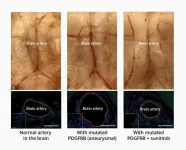(Press-News.org) New research from the University of Cambridge and the University of Melbourne, published in Science Advances, shows neurotypical workers and students taking cognitive enhancers, or ‘smart’ drugs, may actually be inhibiting their performance and productivity.
Drugs such as methylphenidate, sold under the brand name Ritalin among others, are commonly prescribed for attention deficit hyperactivity disorder (ADHD), but are also taken by those without a diagnosis, in the belief that the drugs will enhance focus and cognitive performance.
In four double-blinded, randomised trials in Melbourne, each a week apart, the same 40 healthy participants took one of three popular ‘smart’ drugs (methylphenidate, modafinil or dextroamphetamine) or a placebo. They were assessed on how they performed in a test designed to model the complex decision-making and problem-solving present in our everyday lives.
While previous studies into the effects of smart drugs have used simpler cognitive tasks targeting memory or attention, the Melbourne trial involved more computationally complex activities that better simulate the difficult nature of tasks people encounter in daily life.
Participants were asked to complete an exercise known as the Knapsack Optimisation Problem – or ‘knapsack task’ – in which they were given a virtual knapsack with a set capacity, and a selection of items of different weights and values. The participants had to figure out how to best allocate items to the bag, to maximise the overall value of its contents.
Overall, participants taking the drugs saw small decreases in accuracy and efficiency, along with large increases in time and effort, relative to their results when not taking the drugs.
For example, when given methylphenidate – often used to treat ADHD in children, but increasingly taken by college students cramming for exams – participants took around 50% longer on average to complete the knapsack problem as when they were given a placebo.
In addition, participants who performed at a higher level in the placebo condition compared to the rest of the group tended to show a bigger decrease in performance and productivity after receiving a drug.
In terms of “productivity”, for example – the level of progress per item moved in or out of the knapsack – the participants in the top 25% under a placebo regularly ended up in the bottom 25% under methylphenidate.
By contrast, participants who had a lower performance in a placebo condition only very occasionally exhibited a slight improvement after taking a drug.
Professor Peter Bossaerts, Leverhulme International Professor of Neuroeonomics at the University of Cambridge, believes more research needs to be conducted to find out what effects the drugs are having on users without ADHD.
“Our results suggest that these drugs don’t actually make you ‘smarter’,” said Bossaerts. “Because of the dopamine the drugs induce, we expected to see increased motivation, and they do motivate one to try harder. However, we discovered that this exertion caused more erratic thinking — in ways that we could make precise because the knapsack task had been widely studied in computer science.
“Performance did not generally increase, so questions remain about how the drugs are affecting people’s minds and their decision making.”
Dr Elizabeth Bowman researcher at the Centre for Brain, Mind and Markets at the University of Melbourne and lead author of the study said the results show we have yet to establish the effectiveness of pharmaceutical enhancers on our performance, when used by neurotypical people to perform everyday complex tasks.
“Our research shows drugs that are expected to improve cognitive performance in patients may actually be leading to healthy users working harder while producing a lower quality of work in a longer amount of time,” said Bowman.
END
'Smart' drugs can decrease productivity in people who don't have ADHD, study finds
2023-06-14
ELSE PRESS RELEASES FROM THIS DATE:
The mutant origin of brain aneurysms and the first drug treatment
2023-06-14
Researchers at the RIKEN Center for Brain Science (CBS) in Japan have discovered a set of related mutations that lead to intracranial aneurysms—weakened blood vessels in the brain that can burst at any time. The mutations all appear to act on the same biological signaling pathway, and the researchers report the first ever pharmaceutical treatment in a mouse model, which works by blocking this signal. The study was published in Science Translational Medicine on June 14.
About 5% of the population have unruptured intracranial aneurysms in blood vessels on the surface of the brain. Despite being ballooned arteries with ...
Massive hemorrhages are often deadly. Can a perfume ingredient stop the bleed and save lives?
2023-06-14
The chances of surviving massive blood loss from a traumatic injury such as a gunshot wound are around 50 percent. To survive, a patient needs two things to happen quickly: a large infusion of blood and coagulation at the wound to stop the bleeding.
The problem is one of these solutions prevents the other. Introducing a large amount of blood to those suffering a massive hemorrhage impairs the blood’s ability to clot, a condition known as coagulopathy.
Now, Tulane University researchers have uncovered the cause of coagulopathy in trauma victims receiving a blood infusion. They also found that a synthetic compound ...
Altered gut bacteria may be early sign of Alzheimer’s disease
2023-06-14
People in the earliest stage of Alzheimer’s disease — after brain changes have begun but before cognitive symptoms become apparent — harbor an assortment of bacteria in their intestines that differs from the gut bacteria of healthy people, according to a study by researchers at Washington University School of Medicine in St. Louis.
The findings, published June 14 in Science Translational Medicine, open up the possibility of analyzing the gut bacterial community to identify people at higher risk of developing dementia, and of designing microbiome-altering preventive treatments to stave off cognitive decline.
“We don’t yet know ...
Elimination of type of bacteria suggests treatment for endometriosis
2023-06-14
A research group from the Graduate School of Medicine and iGCORE at Nagoya University in Japan, has discovered that using an antibiotic to target Fusobacterium reduced the formation of lesions associated with endometriosis, a gynecological disorder characterized by endometrial tissue usually found inside the uterus being found outside it. Their findings suggest an alternative treatment for this disorder. The study was published in Science Translational Medicine.
Endometriosis affects one in ten women between the ages of 15 and 49. The disorder can cause lifelong health problems, including pelvic pain and infertility. ...
Newly planted vegetation accelerates dune erosion during extreme storms, research shows
2023-06-14
CORVALLIS, Ore. – Newly planted vegetation on coastal sand dunes can accelerate erosion from extreme waves, a study involving researchers from the Oregon State University College of Engineering suggests.
The authors note the findings run counter to the widely accepted paradigm that vegetation always acts to reduce erosion on dunes, the first line of storm defense for landscapes that are among the world’s most ecologically important and economically valuable.
The experiments involved building beach dune profiles 70 meters long and 4.5 meters high and subjecting ...
Preserving forests to protect deep soil from warming
2023-06-14
A recent study led by scientists at Lawrence Berkeley National Laboratory (Berkeley Lab) and the University of Zurich has revealed that the organic compounds proposed for carbon sequestration in deep soil are highly vulnerable to decomposition under global warming.
The finding has implications for a key strategy in carbon management that relies on soil and forests – natural carbon “sinks” – to mitigate global warming.
About 25 percent of global carbon emissions are captured by forests, grasslands, and rangelands. During photosynthesis, plants store carbon in their cell walls and in the soil. Because ...
Treatment creates steel alloys with superior strength and plasticity
2023-06-14
WEST LAFAYETTE, Ind. — A new treatment tested on a high-quality steel alloy produces extraordinary strength and plasticity, two traits that must typically be balanced rather than combined. Ultra-fine metal grains that the treatment produced in the outermost layer of steel appear to stretch, rotate and then elongate under strain, conferring super-plasticity in a way that Purdue University researchers cannot fully explain.
The researchers treated T-91, a modified steel alloy that is used in nuclear and petrochemical ...
TCT 2023 Program Guide now available
2023-06-14
NEW YORK – June 14, 2023 – The Cardiovascular Research Foundation (CRF) has announced the TCT 2023 Program Guide is now available. TCT is the annual scientific symposium of CRF and the world’s premier educational meeting specializing in interventional cardiovascular medicine. TCT 2023 will take place October 23-26 in San Francisco, California, at the Moscone Center and will celebrate 35 years of leading the field.
Every year, TCT features major medical research breakthroughs and gathers ...
Plate tectonics not required for the emergence of life
2023-06-14
Scientists have taken a journey back in time to unlock the mysteries of Earth’s early history, using tiny mineral crystals called zircons to study plate tectonics billions of years ago. The research sheds light on the conditions that existed in early Earth, revealing a complex interplay between Earth’s crust, core, and the emergence of life.
Plate tectonics allows heat from Earth’s interior to escape to the surface, forming continents and other geological features necessary for life to emerge. Accordingly, “there has been the assumption that plate tectonics is necessary for life,” says John Tarduno, who teaches in the Department ...
Novel research shows older breast cancer survivors experience accelerated aging, worse functional outcomes
2023-06-14
For Immediate Release
Contact
Colleen McDonald
Sr. Consultant, Earned Media - MCW
414.801.3146 | cmcdonald@mcw.edu
Milwaukee, Wis., June 14, 2023 – In a new multi-center study, researchers from the Medical College of Wisconsin (MCW) joined with leading cancer centers from across the nation to examine whether cancer and its treatments accelerate aging. Using novel epigenetic measures to assess biological aging, investigators found that older breast cancer survivors – particularly those exposed to chemotherapy – showed greater epigenetic aging than their same-aged peers without cancer, which ...




